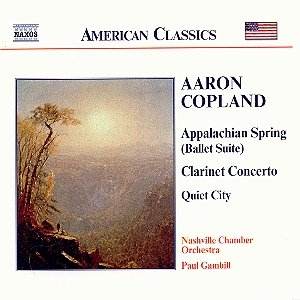In many ways this is a typical Naxos disc. Four standard
works, repertoire pieces (I think that over the last few years I have
heard them all at the Proms and I don’t go every week of the season)
in fine and idiomatic performances, all beautifully recorded by a lesser
known orchestra or ensemble. One knows that for each work there is probably
a slightly better or more exciting performance lurking somewhere in
one’s library or even a finer recording, possibly one by Copland himself
or Bernstein or another musician of historic importance. But you also
know that as a whole the disc is a delight and, at less than £5 in the
UK, one that can easily be packed into the shopping trolley without
too much pain.
Let’s take the Clarinet Concerto. This is perhaps the
finest Clarinet Concerto of the twentieth century. Benny Goodman, a
jazz artist primarily, who in the end recorded it twice, and who immediately
springs to mind when one considers how it might be performed. Most top
players will have it in their repertoire but it doesn’t play itself.
The performer must put a very great deal of themselves into it. Laura
Arden is poised and elegant and when necessary rhythmically alert and
powerful but not especially jazzy. I find her upper register a little
pinched and I much prefer the opening in the wonderful version by Stanley
Drucker with Bernstein on DG (431 672-2) interestingly coupled with
‘Connotations’ and ‘Music for the Theatre’. Drucker’s experience and
fine technique particularly come to the fore in the virtuoso finale;
very athletic and yet with elegant phrasing.
‘Appalachian Spring’ recorded here in its Original
Ballet Suite version is a beautiful reading with ideal tempi, well balanced
and wonderfully sustained especially in the final pages. But I listened
again to Bernstein’s 1961 recording (my version is an elderly CD on
the now defunct CBS label but I believe that it could be available on
Sony) and I was immediately struck by the stronger attack made by the
New York Philharmonic in the Allegro movements - particularly the first.
The quicker tempo is helpful and overall Bernstein is one minute quicker
than Gambill.
Another advantage that Bernstein’s version has and
indeed others, is that the seven individual sections of the work are
separately tracked to enable you to find your favourite bit, for example
the shaker song ‘A Gift to be simple’. Naxos however put the whole work
under one track heading. As I’ve said before, there is a cost implication?
When it comes to ‘Three-Latin American Sketches’ (incidentally
Copland’s last Orchestral work) I was much taken with the exciting articulation
Gambill achieves in the third one entitled ‘Danza de Jalico’ and in
the first. However the second one ‘Paisaje Mexicana’ is surely too slow
and languid.
As for ‘Quiet City’ both soloists Paula Engere (cor
anglais) and Scott Moore (trumpet) play with lyrical, legato phrasing
as if dreamily improvising, an effect, which is just right in this most
atmospheric of Copland scores.
So, to sum up … If you are new to Copland then this
is a very good place to start. While these performances will almost
never disappoint if you already have these pieces in your collection
then probably it’s best to hang on to your money.
Booklet notes by and biographies by Viola Roth are
helpful and clear, and the acoustic and recording unproblematic.
Gary Higginson
